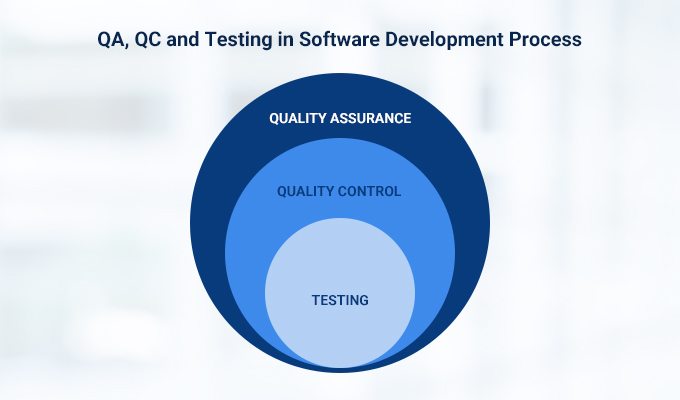Making mistakes is a human phenomenon, but sometimes a small mistake or oversight can prove to be very costly. Like everything else, this holds true for software development too. There can be flaws in a software product’s design and code due to human error but when these mistakes go unidentified they compromise the software quality and result in undesirable and expensive consequences. This is what makes “software quality” so important.
Software Quality refers to the ability of a software product to perform its expected functions in a safe and fault-free manner. Just like you evaluate the quality of fruits before purchasing them by checking their freshness, size and shape, the quality of a software system is evaluated through Quality Assurance (QA). This highlights the importance of quality assurance in software development but this is one of the many reasons why QA matters for software providers, product owners and users.
But before we discuss the reasons for the importance of quality assurance, let’s remind ourselves of some real-life examples of software failures that resulted due to a lack of proper quality management.
Famous Real-Life Examples of Software Mistakes
History has witnessed many examples of software failures — from errors that have cost businesses billions of pounds to mistakes that caused human casualties. Here are some famous examples of software bugs that led to colossal consequences.
In 2012, a case of improper deployment of software spread turmoil across Wall Street when a well-known trading firm lost $440 million in 45 minutes. This happened when an old and unused internal system was incorrectly configured during trading which executed the trade of stocks at wrong prices. By the time the mistake was identified and fixed the company had already lost $10 million a minute. What a nightmare!
In 2015, Starbucks lost millions in sales as a result of a fault during their daily system refresh which led to the shutdown of point-of-sales registers across many outlets in the United States and Canada. The coffee shops were forced to give away free drinks till the systems were fixed and restored. On the bright side, there was free coffee!
In 2017, a Frenchman filed a hefty lawsuit against Uber when a notification bug tipped off his wife about his affair. As a result of the bug, the app continued to push Uber notifications on the wife’s phone, even after he had logged out of his account on her device. A small bug that cost millions of euros and marital bliss!
There are just a few interesting examples that highlight how a major software failure can result in diabolical situations that are far worse than having a minor bug in an app or an inconvenient design flaw. Diligent software quality assurance is important if you want to save your software product from being in news headlines like such.
Understanding the QA Process: Basics of Quality Assurance
Starting from the basics, let’s understand the process of quality assurance and other closely related concepts.
Why is quality assurance important in software development? Often quality assurance is understood as the process of conducting tests to identify bugs and errors in the code of the software product but that is not just what software quality assurance is. Testing is a part of the QA process and an important stage in the software development life cycle but quality assurance practices are not limited to the testing stage only. Similarly, QA is not equivalent to quality control either.
In fact, quality assurance, quality control and testing are related but different concepts. Here’s how they differ from each other.
Quality Assurance, Quality Control and Testing
Testing is the act of checking the software code and design to detect errors and flaws. There are different types of testing procedures such as Grey Box, Black Box, and White Box testing and they can be automated or conducted manually by the QA team to check the performance of a software’s code and design. Testing can be conducted during the testing phase in the software development life cycle or throughout the development process.
Quality Control refers to the process of validating that the developed product corresponds to the requirements and specifications. It is conducted on a completed or near-completed product to ensure that all its features perform perfectly together.
While testing focuses on errors in code and design, quality control focuses on verifying the quality of the product as a whole.
Quality Assurance, on the other hand, is a broad term that encompasses both testing and quality control and focuses on the quality of the overall process of software development. It refers to the consistent improvement of processes to ensure better quality control. Unlike testing and QC, QA is involved at every stage of the development process. It makes sure that each step of the process (Requirement gathering and analysis, planning, designing, coding and development, testing, and launch) is performed right so that quality is maintained throughout the project lifecycle.
The illustration below correctly depicts the concept of all three in relation to each other.

5 Reasons Why Quality Assurance Is Crucial for Every Software Development Project
The result of a thorough quality assurance approach is indeed a high-quality and fault-free software product. But quality assurance is much more than that. In addition to identifying errors and areas of improvement in a product, quality assurance is important for many other aspects of the business such as client relations and the business’ reputation in the market. Let’s shed light on some of the top reasons why quality assurance is essential for every software development project.
Saves Time and Money
Consistent software quality assurance is necessary if you want to save time and money. It can be expensive if mistakes and bugs go unidentified till the later stages in the development process because fixing mistakes in an already designed and coded product is going to be time-consuming, hence cost more money.
As a software provider, it is your responsibility to maintain quality standards at every step along the development process through testing and quality assurance so errors can be identified and fixed early on. A well-thought-out quality assurance strategy will ensure that no mistakes are carried forward to the final stages to prevent any major loss for the software development company and the client.
Ensures Quality and Competitiveness of the Product
The healthcare software industry is unforgiving when it comes to software quality and performance. Examples of software failure mentioned above speak for the consequences a company could face for releasing a faulty software product.
Why is quality assurance important in software development? Well, a simple answer is that if you want your software products to compete in the cut-throat software business, then your products should always maintain quality and standard of performance to compete with the rest. This sheds light on the importance of quality assurance from the standpoint of market competitiveness. Better quality assurance maintains the quality and the competitiveness of the product before it is released to the customers and with every update rollout afterwards.
Ensures Security
Security is always a big question for software products. Whilst a software application may meet its functional requirements and perform exactly as it is supposed to, it may not be completely secure. Vulnerabilities in a software system’s security can compromise the user data and credibility of the software.
This is one of the main reasons why software quality assurance is so important. It helps uncover vulnerabilities in a software’s security and helps build a product that is fully secure and trustworthy.
Maintains Goodwill of the Business
As discussed in the points above, quality assurance is important to avoid loss of time, money, and competitiveness of software products. But software quality assurance is also important to protect a business’ reputation. The inconvenience and, in some cases, legal troubles and controversy caused by faulty software systems can negatively impact the goodwill and position of the software provider in the market. More so, it can jeopardize the relationship between the company and its clients if they a product of substandard quality is delivered.
This is where the importance of QA in software development is most evident. It ensures that your product serves as an apt brand ambassador for your business.
Guarantees User Satisfaction
The software development approach always focuses on the end-users of the product, and it is necessary to guarantee the best user experience. A software system with bugs and errors can cause inconvenience for the users and ruin their experience.
Throughout the development process, QA engineers ensure that the product is developed without faults and performs its expected functions properly when in the hands of the end-users. As a result, users get a quality product that they are happy to use.
Conclusion
Like every other product, quality is important for software systems as well. Whether it is a simple internal system meant to be used by a few people or a software product to cater to millions of users, it is a software company’s job to deliver a quality software product that is well-tested for flaws and vulnerabilities.
Quality assurance helps identify errors and flaws in the software code and design throughout the development process to prevent loss of time and money. It ensures that the end product is competitive, secure, and smoothly performs its expected functions. From the business standpoint, a thorough software development quality assurance practice can help the reputation of the business and guarantee user and client satisfaction.
I hope this article helped you understand the importance of quality assurance in software development.





